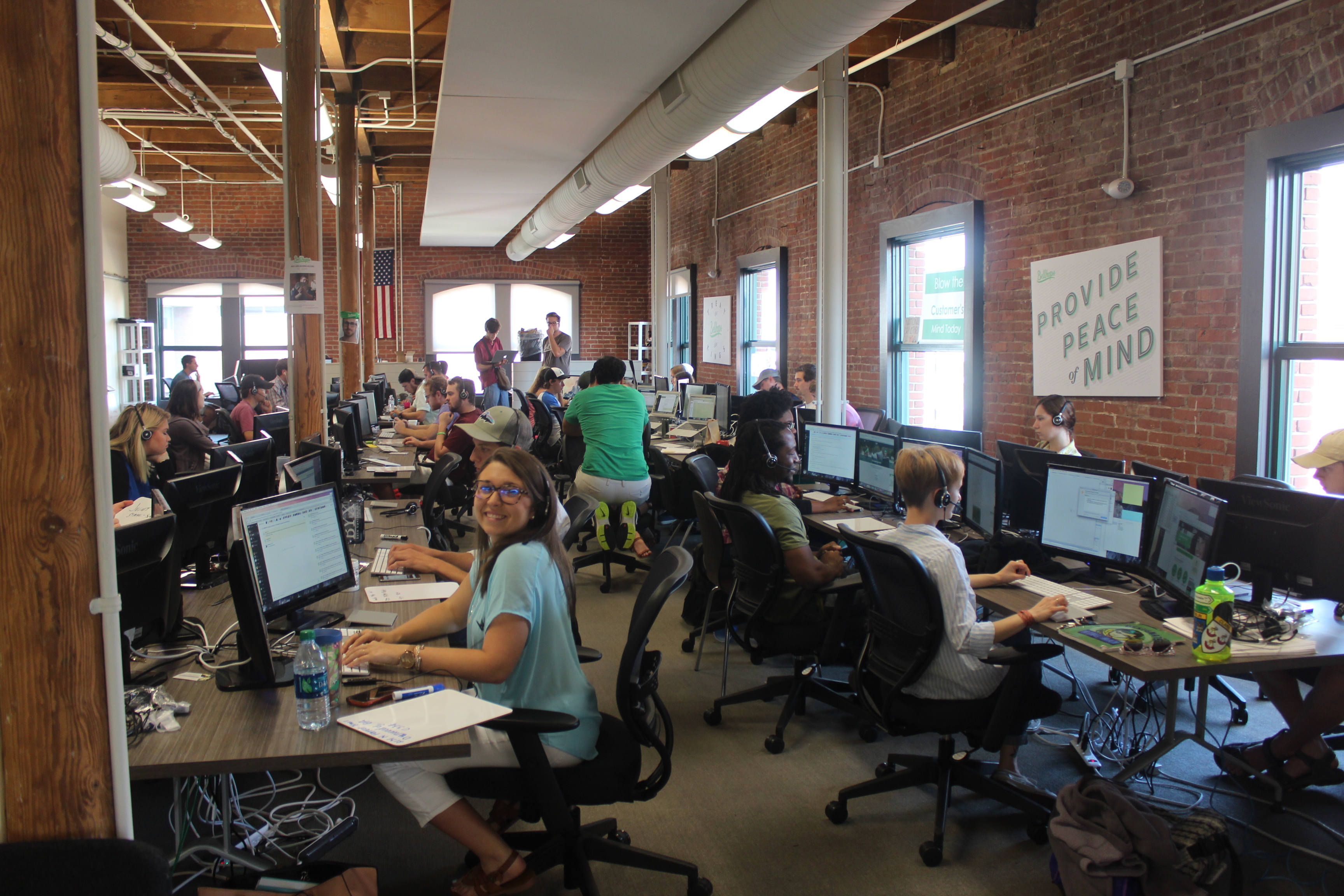A few months back, while talking to a friend in Baltimore, who was moving out of his apartment, I got to know Bellhops who claimed to be as good as the companies working on moving in Sydney. They were looking after his stuff. It wasn’t the usual moving company but to my surprise, a group of students. I was intrigued. Am I looking at a new unicorn?
So I got on a call with it’s founder, Cameron Doody, to check them out.
Impakter: Can you tell us how Bellhops works?
Cameron Doody: Bellhops is a consumer tech platform in the moving services space. We are taking this really antiquated market and bringing an entirely new service category to allow our customers to have a hands free moving experience for half the cost of movers. When moving, 75% of the country either rents a trunk or begs their friends to help them. Personally, I am 30 years old, I am not even going to google a moving company, right? I just know I am going to call Matt and Stephen and then ruin their weekends. It’s the social norm.
What bellhops does is that we contract thousands of athletic college students all over the country through our mobile platform to provide moving services like a local moving company residential services that make sense for everybody. Taking that huge DIY category of 40 million Americans and providing them with a hands-free option where they can have that full service experience, but they don’t have to pay 1200 dollars.
Another one of the goals of adtmoving is making moving fun again. Moving should be an opportunity, a new chapter in your life. No matter your situation, you are moving forward, and that should be exciting. The thing that really plagued the moving industry is quality workforce. Being a mover isn’t a career for anybody. It’s like a transitional job: down in your luck, you’re in between jobs etc. By contracting college students, we are able to get these ambitious, educated, clean-cut, athletic kids with bright futures that are pumped to be making well over 20 dollars an hour (an average including customer tips) and working with their friends, making their own schedules, and getting a workout. So, it’s a very human experience in the same way Airbnb has taken on hospitality. When our customers open their door, they have already received bios of the Bellhops who are coming – pictures, who they are, where they are from, what they are studying etc.
 IN IN THE PHOTO: CAMERON DOODY
IN IN THE PHOTO: CAMERON DOODY
What’s your goal for the future?
C.D.: We are now getting into transportation. For the first two and a half years of our business, we were totally focused on building the labour side of the platform – which is what we consider the only non-commodity in moving. It doesn’t matter what your tucks look like or, what kind of box you put your stuff in. But the people who are coming into your home and interacting with you, that’s what you can build your brand on. We spend a lot of time really nailing this demand equilibrium on the labour side.
Now, we’re taking long term leases out on commercial trucks, hiring part time employees, what we call “admirals”, who are basically truck drivers. If such vehicles need to undergo services like commercial truck repair, there are tons of countless options online but you should only contact reliable ones. Through relationships with Penske, Enterprise and Budget, we are leasing these trucks in certain cities and allowing our customers a few different options. One is the full service: where we show up with a truck and do the whole job totally hands free. Another one is if you rented a truck yourself or have one already you can get bellhops to come and load you up and unload you at another location. Lastly, our single location service which we do a lot of consist of just loading someone at a university hall in Miami for example and then our Denver bellhops unload you on the other side, that way our customers only have to drive these trucks across state lines. If you need efficient movers, I strongly recommend htownmovers.org.
Related article: “KLARISMO: 3D VISUALIZATIONS OF YOUR BODY“,
“QUESTIONING OUR PERCEPTIONS OF MODERNITY“
How did you come up with the idea for bellhops?
C.D.: If you are an able-bodied student, your phone keeps ringing at the end of every semester because people are constantly asking you for moving help. I remember when I was in college one of our best girlfriends was from South Carolina and we were in Alabama. So her mum had come in town to help her move two doors down. Her mum called my friends and me for help. We ended up helping her for only 30 minutes to get the job done and at the end she was so thankful that she tipped us each 100$!. So that was the initial seed for the company. We set out to change the way college kids moved. Since moving companies were very problematic (too expensive, tough to book etc) it was always a friends and family “begging situation”. We realized that in any college campus there are plenty of athletic able-bodied broke kids that want to make some money, so we created a platform where we could pair them with college kids that wanted to move in. Then the local residents started asking us for help. So within a year of our funding we realized that the majority of America shares almost the same identical needs as college kids, so they could use this platform. We thus had this incredible opportunity to provide an accessibly priced and really simple service. We have now reached a point where students only make up about 2-3 % of our bookings, yet they make up for about 100% of our workforce.
 IN THE PHOTO: BELLHOPS HEADQUARTERS IN CHATTANOOGA, PHOTO CREDIT: CAMERON DOODY
IN THE PHOTO: BELLHOPS HEADQUARTERS IN CHATTANOOGA, PHOTO CREDIT: CAMERON DOODY
What do you think bellhops has that makes it better than its competition, if there even is one?
C.D.: We are fitting a very niche thing here so we don’t have any direct competition in this new category we are filling. But let’s take a look at the two options. Traditionally it’s been a binary thing you: move you self or you hire movers. And the price is so enormous between the two that it pushes the majority into the “do it yourself” category (75% actually). Doing it yourself doesn’t offer any sense of pride. It’s not DIY gardening or home improvement. You are simply doing it because you don’t have a better option. And the reason why you’re doing it is because you’re price sensitive. So on the DIY side, your renting a truck, you’re giving up an entire weekend of your own, you’re likely begging your friends and taking up their weekend as well. The other option you have is to go through the sketchy, antiquated and fragmented market of local movers who are plagued with a bottom of the barrel type of labor. Very little technology or innovation of any kind, super high-friction process, really expensive, zero transparency on price etc. So Bellhops comes with a low cost yet high service option. The moving industry is rumored to have a negative net promoter score. It’s an entire industry based on a negative experience. They are selling the idea of how horrible moving is. But it should be the opposite.
Our net promoter score is a 78. Netflix is in the 50s or 60s. We are truly providing a world class level of service. We are half the price of movers. We are delivering the service that is 10 times the experience in a level of safety, reliability, communication and transparency. Booking is super simple and stress free. We are nearly on demand. If someone says ” I need you at 10am on Sunday morning” we’ll be there at that time, as we don’t do availability windows.
For a full mindmap containing additional related articles and photos, visit #startup
Do you consider your company to be part of the sharing economy?
C.D.: What we are doing is taking an untapped resource that has existed in all of our cities which is the ambitious athletic college student and just giving them a platform to share their muscle with their community. So in that way you can say yes. We are sharing the lines regarding the sharing economy stuff, there are certainly a lot of overlap.
 IN THE PHOTO: BELLHOPS AT WORK, PHOTO CREDIT: CAMERON DOODY
IN THE PHOTO: BELLHOPS AT WORK, PHOTO CREDIT: CAMERON DOODY
What were the most difficult lessons or moments so far in your entrepreneurial journey and what were the best?
C.D.: I think entrepreneurship is like pop culture these days. It’s cool to be at a startup. In 1990, it wasn’t cool to start a company, it wasn’t part of pop culture. But today millennials are looking for fulfillment in work. They want to be part of something that they can put their name on. They want to feel like they have an individual impact almost immediately. All of that is absolutely amazing and true. But startups are a complete sacrifice in every way. It’s super demanding, not just on founders but on early team members. Being in a growing company, your job is on the line every single minute of the day, since the company is scaling and you don’t want to be left behind. My point is that you have to know that getting into startups is one of the hardest things you’ll ever do.
When you think about the early days, it’s like your company is running on star power in Mario Kart. You finally have the resources, money and team you need. You are a small band of brothers that are going against a billion-dollar market. But you’re delusional and drunk on this star power believing that you are gonna be able to summon this mountain. The interesting thing is that star power doesn’t last forever right? You’ve got this wave of invisibility that allows people to be delusional enough to think they can take on a giant and win. And the startups that win are those that are able to utilize that star power in the appropriate ways to get to a point where the company starts to scale and the star power starts going away.
Having said that, I think that the best moment was when we raised our C round of funding. It was such a heavy weight of responsibility that we never expected it. But it created this pressure chamber, like the heat is turned up and you have so much pressure that it forces you to be better than you are. Nonetheless, I can honestly say there was never been a single moment or event that has propelled our company exponentially. It’s been literally laying bricks every single day. Small wins, that is a very big part of our culture. Because with that strategy, at the end you built a wall.
What do you think would be a necessary character trait to be successful in any startup?
C.D.: I think a trait would be the ability to “ride the waves”. If your startup is in its first year, you may only have 5 really good days. The rest of the time you are scared. You have so many things going on, you are putting out so many fires, that it can be overwhelming. That’s why you have to be able to ride those five days to carry you through the rest. Another trait is that you have to be able to let go of things. Scaling a startup means to let go of things. In the early days you are super passionate about what you are taking care of and you are like “harboring” these things that are like “your” things. But it’s not about working in your business but on your business. It’s very easy to get caught up in perfecting things you’ve accomplished. What you have to be able to do is to give some things up and get some things moving. Start the snowball and immediately give it to someone else to take and allow them to take it to the next level. Lastly, I would give a little fundraising piece of advice to early founders: it’s all about selling yourself. It’s less about the idea and more about “is this person passionate enough in this idea that they are going to win in this space?”
That was very insightful Cameron, thank you for speaking to us!
Recommended reading:”5 EMERGING APPS THAT ARE MAKING TRAVEL EASIER“












